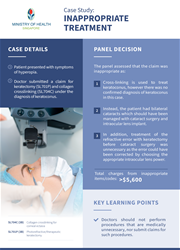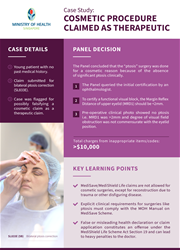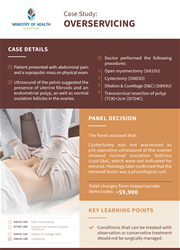INTRODUCTION
Purpose and Use The information and resources in
this page are to guide doctors in making appropriate MediShield Life Claims.
With better understanding, this will support doctors in their discussion with
patients regarding treatment decisions.
Healthcare
affordability is one of the key concerns of Singaporeans. Medical waste and
abuse from inappropriate claims contribute to escalating costs, without
benefiting patients.
Examples of inappropriate claims for
MediShield Life and MediSave include:
-
Overservicing by doctor resulting in unnecessary treatments, procedures,
or admissions
-
Overcharging through inappropriate usage of the Table of Surgical
Procedure (TOSP)[1] codes to claim more for surgeries
-
Claiming for procedures that are not medically necessary, which should
not be covered by MediShield Life and MediSave
Collectively, such behaviours expose patients to more risks of harm due to
unnecessary treatments and also impact patients financially, as they lead to
over-withdrawals from their MediSave or higher out-of-pocket payments. It also
impacts all Singaporeans, as inappropriate claims are funded through
policyholders' premiums.
Role and Responsibilities of Claims Management Office (CMO)In 2022, MOH set up Claims Management Office (CMO) to help govern
appropriate claim behaviours.
CMO's role is to help ensure that
MediShield Life funds are used to pay for medically necessary treatments so that
premiums remain affordable and the scheme remains sustainable.
The
CMO helps manage claim behaviours by:
- Progressively introducing specialty-specific Claims Rules
- Medically scrutinising claims - Claims Adjudication
Through these, CMO also protects patients from unnecessary risks of harm and
co-payment arising from inappropriate claims made by providers.
[1] The TOSP is an exhaustive list of procedures with table ranking, for
which MediSave/ MediShield Life can be claimed. Any procedures not listed or
without a table ranking are not claimable.
CLAIMS RULES
What are Claims Rules?
Claims Rules aim to guide
the medical community on what constitutes an appropriate MediShield Life
claim. They are not clinical practice guidelines per se but are derived from
them.
Claims Rules make clear what is an appropriate
procedure claim under MediShield Life in 5 key areas:
- clinical indication
- setting of procedure
- frequency of claims allowed
- surgical coding
- modality of treatment for specific procedures
Claims Rules cover surgical procedures under a range of medical specialties.
Claims Rules focus on procedures that have high utilisation, and/or a
certain degree of ambiguity or potential for abuse.
-
Claims Rules are developed by MOH-appointed workgroups comprising public
and private sector specialists, in consultation with representative
specialist groups
-
Claims Rules are based on published literature, prevailing clinical
practice, cost-effective guidelines, and
-
Claims Rules are verified against available past claims data to ensure
that they cover the vast majority of claims that are medically
appropriate
How are Claims Rules implemented?
MOH intends to roll
out Claims Rules progressively every year and phased by specialties. Claims
Rules will be refreshed every 2 to 3 years to ensure they keep in tandem
with medical advances.
-
The Claims Rules for
Gastrointestinal Endoscopy and Related Procedures were
released in August 2022
- Cardiology and ENT Claims Rules were released in September 2023
-
Urology, Ophthalmology, General Surgery and Hepatobiliary, and
Orthopaedics (Hip, Knee) Claims Rules will be released in 2024
-
Before each set of Claims Rules are enforced, a transition period (which
is generally about six months) will be provided. During the transition
period, doctors, and medical institutions whose cases are adjudicated,
will be informed of the outcome for learning purposes
Non-Compliance to Claims Rules
-
Doctors with cases that
are not in compliance with Claims Rules will be asked for their clinical
rationale, should such cases be selected for medical adjudication by an
independent Panel of experts appointed by the MediShield Life Council
-
If a claim is adjudicated to be non-compliant with the Claims Rules,
doctors and medical institutions will be asked to rectify the claim and the
MediSave and MediShield Life monies improperly paid out under the claim
should not be recovered from the patient
-
Doctors with non-compliances to Claims Rules that cannot be medically
justified will be monitored closely and enforced against. Refer to
section on enforcement under claims adjudication
Please click here for infographic
CLAIMS ADJUDICATION
What is Claims Adjudication?
MOH started adjudicating MediShield Life claims against prevailing MOH
guidelines and requirements in October 2022. Adjudication happens after the
claim has been settled, thus preserving the current claim submission
process.
-
Claims Adjudication augments the current Table of Surgical Procedures (TOSP)
surveillance audits conducted by MOHH's Group Internal Audit to
encourage the provision of medically necessary treatments and prudent
use of healthcare resources
How are cases selected for Claims Adjudication?
Claims for adjudication are selected from two main sources:
-
Cases that have been whistle-blown by patients, doctors, and insurers,
and
-
Cases where claims have been found to have deviated from peer norms,
Claims Rules of that specialty and general financial claims rules and
guidance issued by MOH e.g. Table of Surgical Procedures (codes for
claiming fees for surgery), MediSave booklet, Agency for Care
Effectiveness guidance
What are the common types of Inappropriate Claims?
Common categories of inappropriate claims are as follows:
-
Inappropriate use of TOSP codes, such as
-
using proxy TOSP code(s) that do not accurately describe the
procedure performed
-
submitting more than one TOSP code where a single TOSP code
adequately describes the episode of surgery/procedure carried
out (e.g. submitting multiple codes for doing Whipple’s
procedure instead of the code describing Whipple)
-
performing each component procedure in a separate episode of
surgery, for procedures that could otherwise be performed under
a single TOSP code and/or episode of surgery/procedure
-
submitting TOSP codes for procedures which were not performed
(This can constitute fraud, which can be prosecuted as a
criminal offence)
-
Over-servicing, such as
- unnecessary tests performed during an episode of admission
-
surgical treatment done before trial of conservative treatment
(e.g. gastroscopy done on patient with 1st episode of
gastritis before trial of antacids)
-
unnecessary admissions for procedures that are commonly done in
day surgery and attempt to claim health screening tests from
insurance (usually not claimable)
-
Claims for procedures excluded by MediShield Life, including,
-
cosmetic procedures and health screening under disguise of
diagnostic procedures/treatment. This can constitute fraud,
which can be prosecuted as a criminal offence
What is the process for Claims Adjudication?
-
Cases are adjudicated by an independent Panel of 3-6 doctors appointed
by the MediShield Life Council (MLC). The doctors are of the relevant
specialty for the case in question, from both private and public sectors
-
If a MediShield Life claim is selected for adjudication, the medical
institution and doctor concerned will be notified in writing and be
required to submit relevant clinical case notes and justifications to
explain any deviation from MediShield Life claim requirements to the
Panel
Doctors would subsequently be informed of the outcome after the Panel has
completed its assessment. The various types of outcomes are as follows:
-
If the Panel deems the claim to be appropriate for the
patient, no change is required for the claim (i.e. MediShield Life and
MediSave payout remains)
-
If the Panel deems the claim to be inappropriate, the
medical practitioner and his / her patient may, within 30 working days
of receiving the Panel’s assessment, submit new evidence to the Panel
for reconsideration. However, if the Panel still concludes the claim to
be inappropriate, the adjudication decision is final. The medical
institution and the doctor will be asked to re-file the claim to rectify
the inappropriate portion of the claim so that the MediShield Life and
MediSave payouts could be adjusted and appropriately reflected. They
should not shift inappropriate charges to other parts of the bill nor
recover from patients
Please click here for infographic
Factors Considered in Determining Appropriateness of a Treatment Under
a MediShield Life Claim*
In assessing the appropriateness of a treatment under the MediShield Life
Claim, the Panel will consider the following, whether the claim is:
-
Aligned to the Singapore Medical Council’s Ethical Code and Ethical
Guidelines
-
In accordance with current generally accepted standards of medical
practice (peer reviewed journals, MOH Guidelines, ACE guidance,
consensus statements, peer concurrence etc.)
-
Clinically appropriate in terms of type, frequency, extent, site, and
duration, and considered effective for the insured person's illness,
injury, or disease
-
Not primarily for the convenience of the insured person, medical
practitioners or medical in situations where treatment is able to be
reasonably rendered in an outpatient setting
-
Not of an investigational or research nature/unapproved by regulatory
authorities
- Not preventive, screening or a health or aesthetic enhancement and
-
Aligned with prevailing guidelines published by MOH and its appointed
agencies, where relevant, including but not limited to MediShield Life
Claims Rules, TOSP Booklet, Manual on MediSave/MediShield
Life claims, Terms and Conditions for Approval under MediSave/MediShield
Life schemes, MOH Finance Circulars related to MediShield Life/MediSave
claims and ACE’s guidance, as far as such guidelines relate to the
medical appropriateness of the treatment
*Above list is not exhaustive
Enforcement against non-compliant providers
MOH will take action against providers with repeated non compliances to
deter inappropriate claim behaviours. These include warnings and
mandatory training to refresh the doctor on rules governing MediShield
Life claims:
-
From 1 Apr 2023, providers with repeated non-compliances can have
their status as approved Medical Practitioner under the MediShield Life and MediSave be suspended or revoked. This would mean that the
doctor will not be able to submit any claims for MediShield Life,
MediSave and Integrated Shield Plan (IP) Insurance. Please refer to
the Terms and Conditions of Approval under the MediSave Scheme and
MediShield Life Scheme
here for more information
-
Doctors will be referred to the Singapore Medical Council (SMC) if
their practices were assessed to potentially contravene SMC Ethical
Code and Guidelines
-
Lastly, where an individual has made a false declaration, omits
information, or provides information which is false or misleading in
a material that results in a claim being overpaid, they can be
prosecuted under Section 19 of the MediShield Life Act. MOH may also
refer cases of potential fraud to the police for criminal
investigation and prosecution
Please click here for infographic
Case Studies**
Individual case studies of inappropriate claims/ adjudicated claims with
outcomes.
Egregious Charging through Multicoding
.png?sfvrsn=41939103_2)
Inappropriate Treatment

Cosmetic Procedure Claimed as Therapeutic Treatment

Overservicing

**Cases are based on real cases, anonymised to protect patient
confidentiality
MediShield Life Claims Rules
FAQs
Claims Rules FAQs
Responses to Feedback on GI Endoscopy CR Consult
Responses to Feedback on ENT CR Consult
Responses to Feedback on Cardiology CR Consult
References for MediShield Life Claims
Table Of Surgical Procedures 2024MOH FCM No. 48/2023 Updates to Table of Surgical Procedures and Call for Submission of Proposals For 2024/2025 Review CycleMOH FCM 45-2023 Reminder on Commencement of Enforcement Against Inappropriate MSHL Claims and Rectification Required
MOH FCM 47-2022 Framework to Ensure Appropriate MediShield Life Claims
MOH FCM 34-2021 Updates to the Table of Surgical Procedures and Reminder on Guidelines on MediShield Life and MediSave Claims for Surgical Procedures
Sharing Your feedback
For feedback pertaining to Claims Rules and Claims Adjudication, please submit by
clicking this
link or
scan the QR code below to access the feedback form.